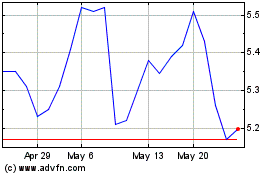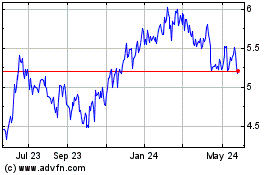SÃ O PAULO—Shares of Brazil's largest bank took a hit Tuesday, a
day after telephone company Oi SA filed the nation's largest
request ever for bankruptcy protection and raised the likelihood of
steep losses for creditors owed nearly $19 billion by the troubled
carrier.
State-controlled Banco do Brasil SA, the country's biggest bank
by assets, finished down 4.5%. Oi's shares fell 18%.
Private-sector lenders Itau Unibanco Holding SA and Banco
Bradesco SA opened lower, then recovered over the course of the
day. Itau ended at 29.39 reais, from 29.40 on Monday, after falling
as much as 2.6% during the day, and Banco Bradesco SA fell as much
as 1.8% before turning positive before the close of trading.
Oi's debt to Banco do Brasil is estimated at more than 5 billion
Brazilian reais, while Itau and Bradesco are said to be owed some
1.5 billion reais each by the telecommunications company, according
to Joã o Pedro Brugger, an analyst at investment company Leme
Investimentos. The three banks declined to comment.
At the end of March, about one-quarter of the roughly 50 billion
reais ($14.75 billion) Oi owed to lenders was in the hands of
commercial banks. Oi owes billions more to Brazil's tax agency, the
country's telecoms regulator and others. Monday's filing by Oi and
six subsidiaries lists 65.4 billion reais ($19.26 billion) in total
debt.
A brutal recession has sent bankruptcy filings soaring in
Brazil, forcing banks to boost their reserves. Oi´ s bankruptcy
protection request will further weigh on the financial sector, said
Luis Miguel Santacreu, an analyst with credit-ratings firm Austin
Rating.
"This happens at a difficult time [for Brazil] and requests for
bankruptcy protection will probably continue to increase," he
said.
Oi's shares were suspended several times on Tuesday as the price
of its preferred shares plunged as much as 30% soon after they
started trading. The shares fell as much as 31% during the day and
closed down 18.2%, while the benchmark Ibovespa index finished up
1%.
Fitch Ratings, Standard & Poor's and Moody's Investors
Service all said Tuesday they downgraded their ratings for Oi.
Fitch, which had downgraded Oi just last Friday as well, cited the
phone company's "debt-laden precarious capital structure" and
negative free cash flow generation.
Oi, Brazil's fourth-largest telecom firm, blamed its financial
collapse on a series of factors, including heavy borrowing to
complete mergers and acquisitions that have not helped the firm
close the technology gap with its main competitors.
Telecoms clients now favor mobile telephones and broadband
internet access, and Oi has had less success than its competitors
in penetrating those two markets. Oi's two mergers, with Brasil
Telecom SA and Portugal Telecom SGPS SA, failed to have the desired
effect of improving its balance sheet.
"Oi has financial and operations problems, competition is hard,
the market is very regulated and technology becomes obsolete fast,"
said Alexandre Furtado Montes, a telecommunications analyst at Rio
de Janeiro-based consulting firm Lopes Filho.
The company posted a net loss of 1.64 billion reais (about $476
million) in the first quarter, compared with a loss of 447 million
reais in the prior-year period. Net revenue dropped 4% over the
same period.
Oi, which has a 34.4% share of Brazil's fixed-line market and
about 70 million clients, asked a Rio de Janeiro court late Monday
for protection from creditors, the equivalent to a chapter 11
filing in the U.S., after debt restructuring talks with creditors
recently.
Earlier this month, Chief Executive Officer Bayard Gontijo
resigned while the talks were still open. The company gave no
specific reason for his departure, but people close to him said he
backed a proposal to convert debt into equity and give bondholders
a controlling stake in the restructured company.
The plan, however, was opposed by the firm´ s main shareholder,
Bratel BV, which was created by former shareholders of Portugal
Telecom using the official name Pharol SGPS. Pharol controls 27.2%
of Oi shares directly and indirectly through its subsidiaries.
"The main reason for Oi´ s bankruptcy protection request is
Pharol," Mr. Montes said, noting Oi has a market capitalization of
only about 1 billion reais, and owes more than 30 times its value
to international creditors. Shareholders "lost the company a long
time ago, it's no longer theirs," he added.
Pharol supported Oi's bankruptcy filing plan, and rejected the
deal favored by Mr. Gontijo, because it didn't want to dilute its
stake so sharply, according to people familiar with the situation.
Pharol on Tuesday said it reaffirms its "determination to continue
to defend the value of its main asset."
Shareholders including Pharol had been negotiating with
creditors represented by investment bank Moelis & Co, which
will continue working with international investors such as Pacific
Investment Management and Co., Citadel LLC and Wellington
Management Co, according to a person close to the negotiations.
The indebted company could also be sold or merge with a local or
international telecommunications player, some analysts said.
Oi could also sell only a specific business or one of its
subsidiaries, said Arthur Almeida, a Sã o Paulo-based legal analyst
at Debtwire Analytics. Its large base of fixed-line clients could
be helpful to a competitor wanting to expand its businesses in
other segments as well, Mr. Almeida noted.
"It's possible one of the larger telecommunications companies
operating in Brazil may show interest in Oi. It's also viable that
an international candidate could come up, as Brazil is cheap for
outsiders, " said Leme's Mr. Brugger.
Oi has been roiled by management instability and failed attempts
to find new sources of capital. Marco Schroeder, who replaced Mr.
Gontijo earlier in this month, is the company's sixth chief
executive since 2011. A potential deal with Russian billionaire
Mikhail Fridman to help Oi finance a merger with Telecom Italia
SpA's Brazilian unit fell through in February.
Local news media have reported that Egyptian billionaire Naguib
Sawiris, owner of Global Telecom, is considering purchasing part of
Oi.
Write to Luciana Magalhaes at Luciana.Magalhaes@dowjones.com,
Rogerio Jelmayer at rogerio.jelmayer@wsj.com and Patricia Kowsmann
at patricia.kowsmann@wsj.com
(END) Dow Jones Newswires
June 21, 2016 21:25 ET (01:25 GMT)
Copyright (c) 2016 Dow Jones & Company, Inc.
Banco Do Brasil (PK) (USOTC:BDORY)
Historical Stock Chart
From Oct 2024 to Nov 2024

Banco Do Brasil (PK) (USOTC:BDORY)
Historical Stock Chart
From Nov 2023 to Nov 2024
